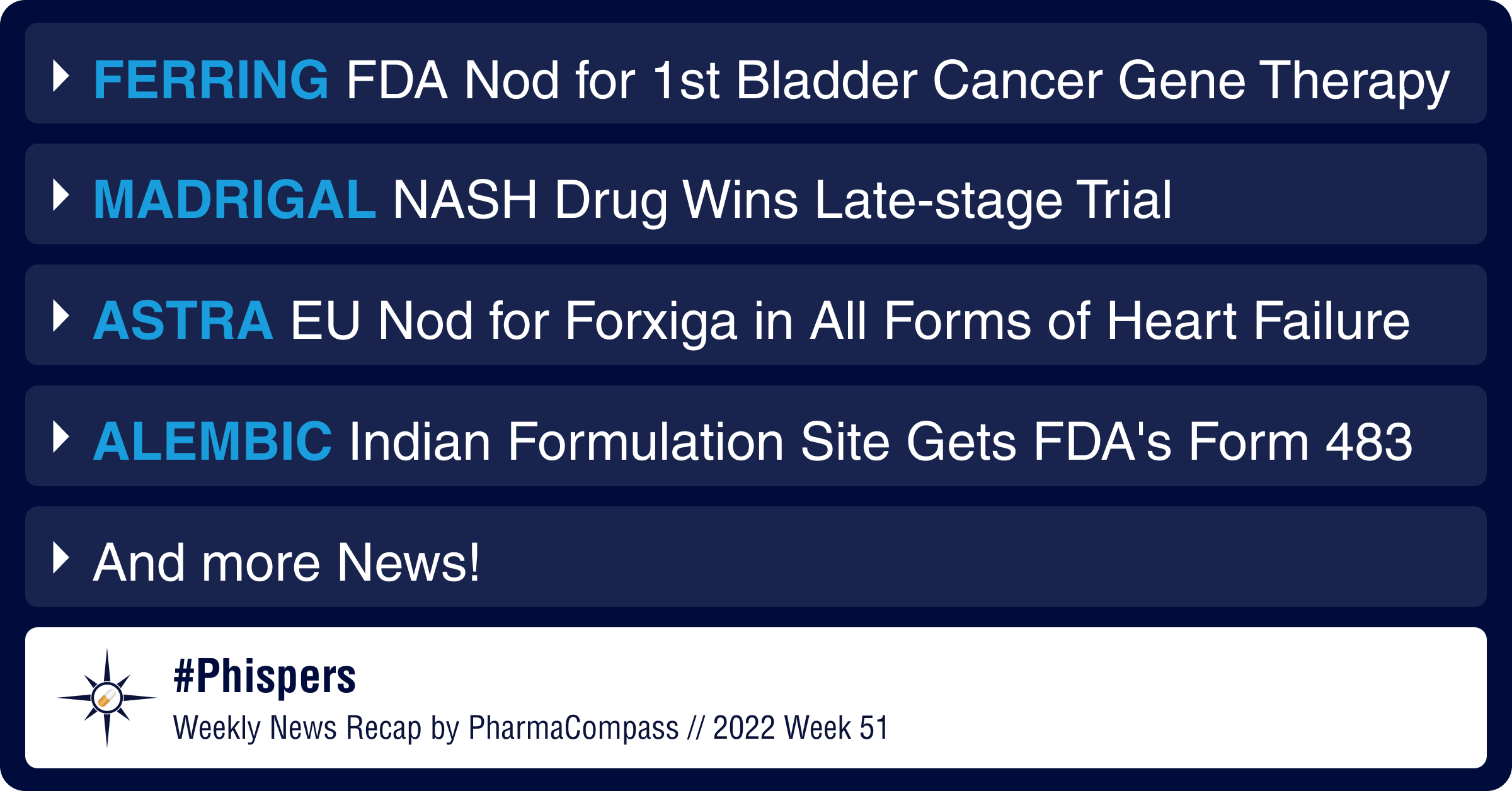
By PharmaCompass
2022-12-22
Impressions: 2,552
The Indian pharmaceutical industry, which relies heavily on China for raw materials, has been hit hard by China’s fresh Covid-19 wave, pushing up prices of key APIs in India by up to 25 percent.
In Phispers this week, we bring you news of several approvals. Swiss drugmaker Ferring Pharmaceuticals’ Adstiladrin has become the first gene therapy in the US to treat adult patients with an aggressive form of bladder cancer. AbbVie’s blockbuster drug –Vraylar (cariprazine) – has been approved by the US Food and Drug Administration (FDA) as an add-on therapy to treat major depressive disorder (MDD) in adults.
AstraZeneca’s blockbuster drug Forxiga (dapagliflozin) has won marketing authorization in Europe as a treatment for all forms of heart failure. But a second Astra blockbuster drug – Imfinzi – has failed a phase 3 lung cancer trial. Atara Biotherapeutics’ Ebvallo (tabelecleucel) has received marketing authorization in Europe as a monotherapy to treat a rare disease that affects people who have undergone a solid organ or hematopoietic stem cell transplant.
In deals, Sanofi has expanded its collaboration with Innate Pharma in a bid to develop new immunotherapies for cancer patients. And Eli Lilly said it will partner with Japanese drugmaker Sosei Heptares to discover, develop and commercialize diabetes and metabolic disease drugs which target a specific kind of proteins.
Madrigal Pharmaceuticals’ experimental drug to treat nonalcoholic steatohepatitis (NASH) – resmetirom – met the main goals in a late-stage study. Currently there are no treatments for this disease. Astellas Pharma said its cancer drug zolbetuximab and chemotherapy combo helped improve progression-free survival in patients suffering from CLDN18.2-positive, HER2-negative, locally advanced unresectable or metastatic gastric or gastroesophageal junction (GEJ) adenocarcinoma in a late-stage trial.
Indian authorities have told the World Health Organization (WHO) that test samples of Maiden Pharmaceuticals’ cough and cold syrups were not contaminated. However, Gambian lawmakers want to pursue legal action against the Indian drugmaker.
US lawmakers are expected to vote on a bill that would require pharmaceutical companies to begin confirmatory testing of their drugs before they request the FDA for accelerated approvals. And, the agency has issued a Form 483 with five procedural observations to Alembic Pharmaceuticals’ solid oral formulation facility in Gujarat (India).
Prices of key APIs in India rise 25 percent as supplies get hit by China’s Covid crisis
The Indian pharmaceutical industry, which relies heavily on China for active pharmaceutical ingredients (APIs) and intermediates, has been hit hard by the Covid-19 wave sweeping China. Prices of key APIs like paracetamol, azithromycin and several other antibiotics have risen by up to 25 percent in recent days, according to a report published in The Economic Times. Exports have dropped due to the rise in domestic demand for medicines in China. And with cases still surging, the Indian pharma industry is worried about a potential disruption in supply. Unless the situation normalizes, the Indian pharma industry could face a shortage of some essential drugs.
Ferring’s drug becomes first gene therapy in US to treat aggressive bladder cancer
Swiss drugmaker Ferring Pharmaceuticals’ Adstiladrin has become the first gene therapy in the US to be approved to treat adult patients with an aggressive form of bladder cancer.
The FDA has approved Adstiladrin (nadofaragene firadenovec-vncg) for the treatment of adults with high-risk, Bacillus Calmette-Guérin (BCG)-unresponsive non-muscle invasive bladder cancer with carcinoma in situ with or without papillary tumors. The therapy is administered once every three months into the patient’s bladder.
The US agency’s approval is based on the results of a late-stage study where the drug met its primary endpoint, with more than 50 percent of the patients achieving a complete response by three months. And around 46 percent of those patients remained free of high-grade recurrence at 12 months. Adstiladrin is expected to be available in the US in the second half of 2023. The therapy will compete against Merck’s blockbuster drug Keytruda.
EMA backs CSL’s gene therapy for hemophilia B: European Medicines Agency (EMA) has recommended CSL’s one-time gene therapy for conditional marketing authorization in the European Union as a treatment for hemophilia B, a rare bleeding disorder caused by genetic anomalies. The FDA had approved the Australian drugmaker’s gene therapy in the same condition in late November. At US$ 3.5 million, it is the world’s most expensive medicine.
FDA okays AbbVie’s Vraylar as adjunctive therapy for major depressive disorder
AbbVie’s blockbuster drug Vraylar (cariprazine) has been approved by the FDA as an add-on therapy to treat major depressive disorder (MDD) in adults – one of the most common mental disorders in the US. The approval, based on a phase 3 trial on 751 patients in seven countries, will help patients who have had an inadequate clinical response to antidepressant monotherapy. This is the fourth approval for Vraylar. The drug earned US$ 1.7 billion for AbbVie in 2021.
Eagle’s Pemfexy bags fifth approval: The FDA has approved a fifth indication for Eagle Pharmaceuticals’ intravenous formulation Pemfexy. The drug, in combination with Merck’s Keytruda and platinum chemotherapy, has been approved for the initial treatment of patients suffering from metastatic non-squamous non-small cell lung cancer (NSCLC) with no EGFR or ALK genomic tumor aberrations. With this approval, Pemfexy is now approved for all of the same indications as Eli Lilly’s Alimta.
FDA lifts clinical hold on bluebird bio’s drug: The FDA has lifted a partial clinical hold on studies of bluebird bio’s experimental gene therapy — lovo-cel — to treat sickle cell disease. The agency had imposed the hold in December last year after a trial patient developed a case of persistent anemia.
Astra’s Forxiga wins EU nod to treat heart failure; Imfinzi fails lung cancer trial
AstraZeneca’s blockbuster drug Forxiga (dapagliflozin) has won marketing authorization in Europe as a treatment for all forms of heart failure. The drugmaker expects the authorization to help increase the SGLT2 inhibitor’s addressable heart failure patient population by 50 percent. The drug generated around US$ 1 billion in sales in the first three quarters of 2022.
A second Astra blockbuster drug – Imfinzi – has failed a phase 3 trial testing the drug as a monotherapy for patients with late-stage metastatic non-small cell lung cancer (NSCLC) with tumor cells that expressed 25 percent or more of the protein PD-L1.
Meanwhile, the FDA has decided to delay its decision on Astra and Merck’s drug Lynparza as a treatment for metastatic castration-resistant prostate cancer (mCRPC) by three months to March 2023 to “provide further time for the full review of the submission.” Interestingly, on Wednesday, the EMA granted approval to the combo for treatment of mCRPC in adult men for whom chemotherapy is not clinically indicated.
Atara’s therapy for rare post-transplant complication gets EU nod: Atara Biotherapeutics’ Ebvallo (tabelecleucel) has received marketing authorization in Europe as a monotherapy for the treatment of patients two years and older with relapsed or refractory Epstein‑Barr virus positive post‑transplant lymphoproliferative disease (EBV+ PTLD) who have received at least one prior therapy. This is the first allogeneic T cell therapy to be authorized in the world. EBV+ PTLD is a rare disease that affects people who have undergone a solid organ or hematopoietic stem cell transplant.
Sanofi expands oncology deal with Innate by adding US$ 1.44 billion in biobucks
Sanofi has agreed to expand its collaboration with fellow French drugmaker Innate Pharma in a bid to develop new immunotherapies for cancer patients. As part of the expanded deal, Sanofi will pay €25 million (US$ 26.6 million) upfront to license a natural killer (NK) cell engager program to target the glycoprotein B7H3 using Innate’s ANKET platform, an antibody-based NK cell engager therapeutics.
Sanofi will also have the option to add two more targets to the deal and will be responsible for the development, manufacturing and commercialization of the candidates. Sanofi has also promised up to €1.35 billion (US$ 1.44 billion) in developmental and commercial milestones along with royalties. The two companies had first entered into a potential €400 million (US$ 425 million) collaboration in 2016 to develop two bispecific NK cell engagers.
Lilly, Sosei tie up to develop diabetes, metabolic drugs: Eli Lilly will partner with Japanese drugmaker Sosei Heptares to discover, develop and commercialize diabetes and metabolic disease drugs targeting G protein-coupled receptor (GPCR) – a family of proteins found in cell membranes that control several essential functions. The drugmakers will use Sosei’s StaR drug discovery technology to develop the drugs. Lilly will pay US$ 37 million upfront in cash for the right to nominate GPCR targets and Sosei will deliver small molecule candidates for further development and commercialization. Sosei will also be eligible for up to US$ 694 million in development and commercial milestones, along with tiered royalties.
Madrigal zips past rivals in NASH race as its drug scores wins in late-stage trial
Shares of Pennsylvania-based Madrigal Pharmaceuticals rose threefold this week after its experimental drug to treat nonalcoholic steatohepatitis (NASH) – resmetirom – met the main goals in a late-stage study. The trial’s success has propelled Madrigal to the forefront of a race to develop the first treatment for NASH, a form of non-alcoholic fatty liver disease that causes fibrosis or scarring and can lead to cirrhosis and liver failure. Madrigal plans to move FDA for an accelerated approval for resmetirom in non-cirrhotic NASH with liver fibrosis in 2023.
Astellas’ cancer drug hits mark in phase 3 trial: Astellas Pharma said its experimental cancer drug zolbetuximab and chemotherapy regimen combo helped improve progression-free survival in patients suffering from CLDN18.2-positive, HER2-negative, locally advanced unresectable or metastatic gastric or gastroesophageal junction (GEJ) adenocarcinoma in a late-stage trial. The drug and the chemotherapy regimen also met the key secondary endpoint for overall survival. This is the second phase 3 win for the drug within a month. Astellas had gained access to the drug after it acquired Ganymed Pharmaceuticals for around US$ 1.4 billion in 2016.
India gives clean chit to Maiden’s products; Gambia seeks legal action against firm
In October, WHO had issued a statement that said contaminated cough and cold syrups manufactured by Indian drugmaker Maiden Pharmaceuticals may have caused the deaths of 70 children from acute kidney injuries in The Gambia. Indian health authorities had announced a production halt at Maiden’s factory in northern India following the WHO report.
Recently, Indian authorities told WHO that test samples of Maiden’s products comply with the specifications and weren’t found to be contaminated. Maiden said it will seek an approval to reopen its main factory in northern India following the government’s report.
Meanwhile, the WHO has said it stands by its comment. The Gambia, on the other hand, is investigating the case. A parliamentary panel in The Gambia has alleged that Maiden’s products were responsible for the deaths. The panel has asked the government to pursue legal action.
US lawmakers to vote on bill seeking reforms in FDA’s accelerated approval process
This week, US lawmakers are expected to vote on a bill that would require pharmaceutical companies to begin confirmatory testing of their drugs before requesting the FDA for accelerated approvals. The “omnibus” spending bill also seeks to expedite the process for removing conditionally approved medicines following failed trials.
The proposed bill also seeks to empower the FDA to specify the design of confirmatory trials and ask the drugmakers to submit progress reports on their confirmatory trials every six months. It proposes to provide the FDA with US$ 3.5 billion in discretionary funding, a hike of US$ 226 million over 2022. This figure excludes user fees, which would bring the total to US$ 6.6 billion.
FDA issues Form 483 with five observations to Alembic’s Indian formulation facility
The FDA has issued a Form 483 with five procedural observations to Alembic Pharmaceuticals’ solid oral formulation facility (F-4) located at Jarod in the Indian state of Gujarat. The agency issued the Form 483 after conducting a pre-approval inspection of the facility. The drugmaker said none of the observations are related to data integrity and are addressable.
Novartis to lay off over 280 people in New Jersey: Novartis will lay off over 280 people in East Hanover, New Jersey, as part of its ongoing restructuring process. The layoffs will take effect by January 28, according to a local Worker Adjustment and Retraining Notification Act notice.The PharmaCompass Newsletter – Sign Up, Stay Ahead
Feedback, help us to improve. Click here
Image Credit : Phisper Infographic by SCORR MARKETING & PharmaCompass license under CC BY 2.0
“ The article is based on the information available in public and which the author believes to be true. The author is not disseminating any information, which the author believes or knows, is confidential or in conflict with the privacy of any person. The views expressed or information supplied through this article is mere opinion and observation of the author. The author does not intend to defame, insult or, cause loss or damage to anyone, in any manner, through this article.”








